-

Yue Luna Bai
Yue (Luna) Bai received her PhD in Environmental Science and Engineering, specializing in physical oceanography, from Caltech. She is now a postdoctoral scholar at Scripps Institution of Oceanography. Luna studies how air—sea interactions shape the climate system. Her postdoctoral work will apply machine learning to quantify small-scale air—sea interaction’s influence on surface carbon exchange and heat fluxes. Luna’s STEM Mentor is Sarah Gille, and her AI Co-Mentor is Yuanyuan Shi. -

Ami Doshi
Ami Doshi received her PhD from a joint program conducted by Indian Institute of Technology Bombay, India and Monash University, Australia. Currently a postdoctoral research scholar at UC San Diego, her research involves developing a microphysiological model of human brain to investigate blood-based biomarkers that cause neuroinflammation. She aims to identify novel blood-based biomarkers that are responsible for brain aging and neurodegenerative diseases. She will use machine learning models to compute blood biomarkers from large human cohorts and correlate biomarkers with aging and potential drug targets. Dr. Doshi’s STEM Mentor is Kiana Aran, and her AI Co-Mentor is Farinaz Koushanfar. -

Yasmin Kassim
Yasmin Kassim is a Schmidt AI in Science Fellow and postdoctoral researcher at UC San Diego specializing in biomedical image processing, computer vision, and deep learning. She previously worked at the NIH and Akoya Biosciences and earned a PhD in Computer Engineering from the University of Missouri–Columbia, receiving the 2017 Outstanding PhD Student Award (EECS). Across academia and industry, she builds rigorous AI tools and foundation models that convert images into quantitative insight and scalable measurements, reflected in awards and a strong publication record. Looking ahead with Schmidt, she will channel this momentum into next-generation AI models and tools for organelle analysis and dynamics. Dr. Kassim's STEM Mentor is Uri Manor, and her AI Co-Mentor is Marc Niethammer. -

Adam Klie
Adam Klie received his PhD in Bioinformatics and Systems Biology from UC San Diego and is now a postdoctoral scholar in the Division of Medical Genetics. His research combines large-scale genomics and machine learning to study how cells interpret the genetic code in DNA. He develops predictive models to understand how genetic variants influence development and disease and to reveal the biological mechanisms underlying these effects. Adam ultimately hopes this work will support applications in precision medicine and gene therapy. Dr. Klie’s STEM Mentor is Hannah Carter, and his AI Co-Mentor is Tiffany Amariuta. -

Sandip Roy
Sandip Roy uses machine learning and astrophysics to uncover the particle nature of dark matter. He earned his Physics PhD at Princeton University, where he developed the first galaxy simulation framework capable of modelling multiple dark matter species simultaneously. Now, as a postdoctoral researcher in the UCSD Department of Astrophysics and Astronomy, his research focuses on developing physics-informed deep learning frameworks to emulate simulations and explore galaxy formation with different dark matter models. He also applies techniques from theoretical physics to advance deep learning theory. His STEM mentor is Ethan Nadler and his AI mentor is Rose Yu. -

Mahesh Kumar Mulimani
Mahesh Kumar Mulimani received his PhD in the Department of Physics from the Indian Institute of Science, Bangalore, India, where he worked on computational modelsemploying PDEs and realistic electrophysiological models to study pathological spiral and multi-spiral electrical wave formations that underlie cardiac arrhythmias. Since then, his research interest is focused on understanding complex non-linear systems, using approaches ranging from simple mechanistic models to machine learning. Currently, his work centers on employing deep learning techniques to predict the spatial protein expressions crucial for the formation of protrusions that eventually lead to the motion and migration of Dictyostelium discoideum cells. Dr. Mulimani's STEM Mentor is Wouter-Jan Rappel, and his AI Co-Mentor is Rose Yu. -

Roya Moghaddasi Fereidani
Roya Moghaddasi Fereidani earned her PhD in Theoretical Physical Chemistry from the École Polytechnique Fédérale de Lausanne (EPFL). She is currently a postdoctoral scholar in the Department of Chemistry and Biochemistry at UC San Diego. Her research focuses on molecular structure and dynamics revealed through ultrafast time-resolved x-ray scattering. Through her AI Schmidt Fellowship, Roya will apply machine learning techniques to predict molecular motions, chemical dynamics, and reaction pathways directly from x-ray scattering data. Her STEM Mentor is Prof. Haiwang Yong, and her AI Co-Mentor is Prof. Wanlu Li. -

Yingjun Zhang
Yingjun Zhang received his PhD in Marine Science from the University of South Florida's College of Marine Science. His research interests lie in (sub)mesoscale ocean processes, particularly eddies and fronts, and their roles in physical-biological interactions and air-sea interactions using satellite observations, in situ measurements, and km-scale realistic numerical simulations. As a postdoctoral fellow at Scripps Institution of Oceanography, he explores submesoscale ocean dynamics and their impacts on vertical heat fluxes at the air-sea interface, leveraging advanced Surface Water and Ocean Topography (SWOT) satellite observations and deep learning techniques. His STEM Mentor is Lia Siegelman and AI Co-Mentor is Nuno Vasconcelos.
2025-2027
2024-2026
-
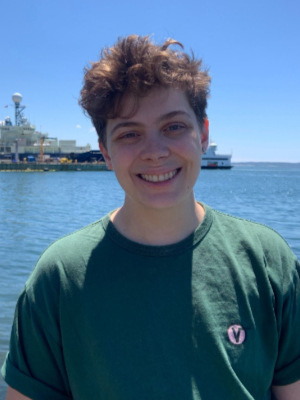
Rory Basinski-Ferris
Rory Basinski-Ferris received a PhD in Atmosphere-Ocean Science and Mathematics from New York University and is a postdoctoral scholar at Scripps Institution of Oceanography. Their research interests are in understanding large-scale climate and ocean dynamics using theoretical tools and model hierarchies. In their postdoctoral work, they will focus on using machine learning to generalize regional climate responses to different anthropogenic emissions scenarios and build an understanding of the relevant physical processes. Dr. Basinki-Ferris' STEM Mentor is Ian Eisenman, and their AI Co-Mentor is Rose Yu.
-
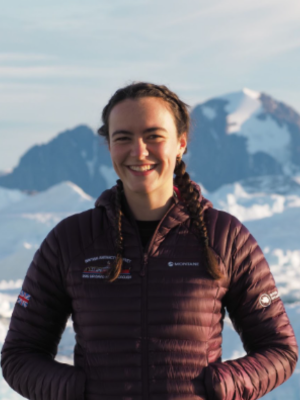
Bryony Freer
Bryony Freer received her PhD in Glaciology and Earth Observation from the British Antarctic Survey and University of Leeds. Currently a postdoctoral fellow at the Scripps Institution of Oceanography, her research centers on investigating the dynamics of grounding zones at the margins of the Antarctic Ice Sheet. She aims to develop innovative approaches that integrate satellite-derived datasets with Artificial Intelligence to improve understanding of these critical regions, which are a key source of uncertainty in future sea-level rise projections. Bryony is passionate about science communication, especially engaging with school children to raise awareness of the impacts of climate change on the polar regions. Dr. Freer's STEM Mentor is Helen Amanda Fricker, and her AI Co-Mentor is Mai Nguyen.
-
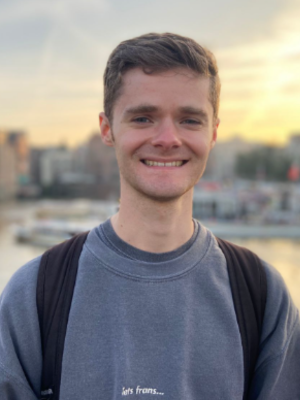
Christian Harding
Christian Harding obtained his PhD in physiology, anatomy and genetics at the University of Oxford, and is a postdoctoral scholar in the Department of Medicine. His research focuses on leveraging machine learning to identify obstructive sleep apnea (OSA) disease subtypes based on physiological traits derived from recordings of respiratory and brain activity during sleep. The ultimate goal is to use these subtypes to inform the development of targeted therapeutic approaches, improving the treatment of OSA. Dr. Harding's STEM Mentor is Atul Malhotra, and his AI Co-Mentor is Julian McAuley,
-
Niklas Klusch
Niklas Klusch received his PhD in Biology at the Max Planck Institute of Biophysics in Frankfurt, Germany. As a postdoctoral researcher in the Villa lab at UCSD, Niklas uses the cutting-edge technique of in situ electron cryo-tomography to investigate the Jumbo phage infection cycle in bacteria. He will utilize deep learning algorithms to unravel the orchestrated protein communities of infected cells. Understanding the structure and function of protein complexes that are part of the intricate phage network will enable targeted genetic modification and a customized phage therapy. Dr. Klusch's STEM Mentor is Elizabeth Villa, and his AI Co-Mentor is Pengtao Xie.
-
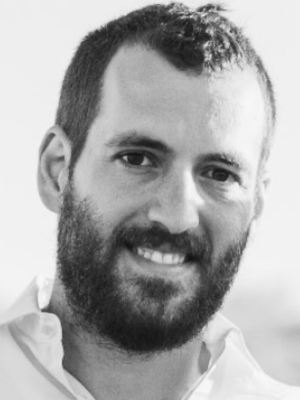
Yohai Magen
Yohai Magen is a postdoctoral fellow at the Institute of Geophysics and Planetary Physics, having received his PhD at Tel Aviv University. Yohai uses a broad range of methods to research plate tectonics and the earthquake cycle. During his Schmidt AI In Science fellowship, Yohai aims to enhance our understanding of the mechanics behind different fault slip phenomena through the use of numerical methods and high-performance computing. He plans to utilize AI techniques to address the limitations in our current ability to model earthquakes and comprehend the factors that influence their timing. Dr. Magen's STEM Mentor is Alice Gabriel, and his AI Co-Mentor is Ilkay Altintas,
-
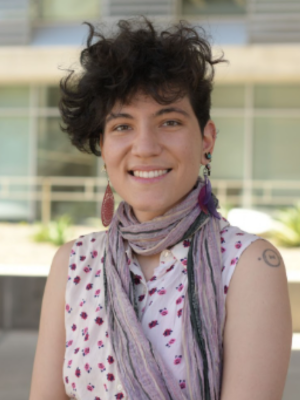
Gabriela Navas-Zuloaga
Gabriela Navas-Zuloaga, originally from Bogotá, earned her PhD in Applied Mathematics for the Life and Social Sciences from Arizona State University. As a postdoctoral researcher in Computational Neuroscience, she investigates the neural dynamics of sleep, learning, and memory. Her research will leverage biologically grounded artificial neural networks, trained on neural recordings, to infer synaptic plasticity rules that govern learning processes in the brain. Dr. Navas-Zuloaga's STEM Mentor is Maksim Bazhenov, and her AI Co-Mentor is Gal Mishne. -
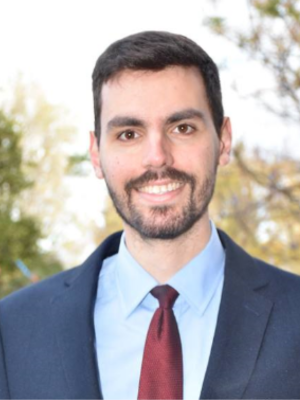
Konstantinos D. Polyzos
Konstantinos D. Polyzos is a Postdoctoral Fellow at the Electrical and Computer Engineering department (ECE) at University of California San Diego having recently obtained his Ph.D at the ECE department at the University of Minnesota. His research focuses on learning, inferring and optimizing with just a few data. Specifically, he has been developing and leveraging active- , transfer- , and self-supervised learning and Bayesian optimization methods to learn and/or optimize when only a few input-output data are available due to privacy concerns or high sampling costs, with application to healthcare, 5G networks and robotics. Dr. Polyzos' STEM and AI Mentor is Tara Javidi.
-
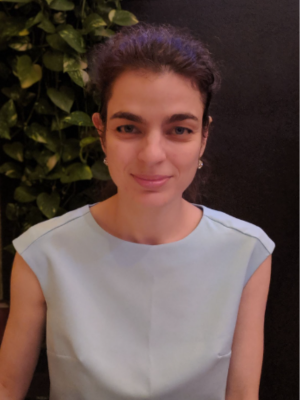
Eleonora Rachtman
Eleonora Rachtman earned her PhD in Bioinformatics and Systems Biology from UC San Diego and is now a postdoctoral scholar in Electrical and Computer Engineering. She develops algorithms to analyze big genomic datasets and infer evolutionary relationships between species. Her postdoctoral work focuses on incorporating deep learning into phylogenomic analysis, specifically by developing machine learning algorithms to add new species to large phylogenies without reconstructing them from scratch. This approach enhances existing binning and species identification techniques and aims to address challenges in bacterial and viral metagenomics, improving pathogen detection, understanding microbial diversity, and unraveling evolutionary dynamics of various species. Dr. Rachtman's STEM and AI Mentors are Siavash Mirarab & Davey Smith.
-
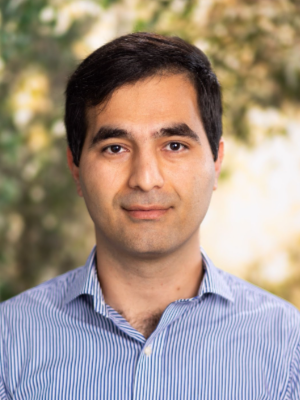
Mahdi Soleymani
Mahdi Soleymani received his Ph.D. in Electrical and Computer Engineering from the University of Michigan, Ann Arbor, where his research centered on information and coding theory, particularly in the context of wireless communication systems, security, privacy, and distributed computing. Currently a postdoctoral researcher at the University of California San Diego, he specializes in statistical learning and learning theory, employing algebraic and combinatorial methods to develop efficient learning algorithms with proven performance guarantees. His current focus is on leveraging artificial intelligence to address underdetermined systems of equations in scientific applications through modern machine learning techniques.
2023-2025
-
Caitlin Aamodt
Caitlin Aamodt is a postdoctoral scholar in the Department of Pediatrics who uses induced pluripotent stem cell-derived neurons and organoids to characterize the molecular mechanisms dysregulated in autism spectrum disorder. The goal of this work is to use computational tools and machine learning to understand the connections between pharmacogenetics, regulatory mechanisms, and individual phenotypes. Caitlin's doctoral research at UCLA focused on using songbirds to discover novel candidate therapeutics for speech and language deficits. Caitlin's current work includes a continuation of this project in human cell models as well as studying the effects of prenatal SSRI exposure on histone serotonylation in ASD. Dr. Aamodt's STEM Mentor is Nathan E. Lewis and her AI Co-Mentor is Pengtao Xie. -
Avik Biswas
Avik Biswas obtained his PhD in Physics at the Center for Biophysics and Computational Biology, Temple University, Philadelphia. As a postdoctoral fellow, Avik is using physics-based machine learning and AI models combined with cryogenic electron microscopy (cryo-EM) to uncover the temporal ordering pathways and mechanisms through which drug resistance evolves in HIV and other viruses, based on viral protein sequence data collected from drug-experienced patients. Avik ultimately hopes to develop the methodology to preemptively predict the emergence of drug-resistant mutations against new and emerging drugs in the clinic. Dr. Biswas's STEM Mentors is Dmitry Lyumkis and his AI Co-Mentors are Fan Chung Graham and Ludmil Alexandrov. -
Carla Calvo-Tusell
Carla Calvó-Tusell received a PhD in Chemistry from the University of Girona. As a postdoctoral scholar at UC San Diego, Carla works on computational modeling of biochemical processes, with special focus on studying respiratory viruses in aerosols through the lens of a computational microscope. The objective is to use all-atom molecular dynamics simulations and artificial intelligence to understand the activity of new virus variants based on their dynamical behavior in the aerosol environment. Carla's interests also include working toward a more inclusive environment in science. Dr. Calvo-Tusell's STEM Mentor is Rommie Amaro and their AI Co-Mentor is Yatish Turakhia. -
Marcelo Caparotta
Marcelo Caparotta is a postdoctoral scholar at the Skaggs School of Pharmacy & Pharmaceutical Sciences. Previously, he served as a postdoctoral associate at the University of Florida's Department of Chemistry and Quantum Theory Project, where he developed enhanced sampling techniques for molecular dynamics simulations. Hailing from Argentina, he attained his PhD in Science and Technology in 2022 from Universidad Nacional de Cuyo. Marcelo's research now revolves around cutting-edge drug discovery utilizing generative AI. His new work focuses on advancing AI's role in ligand discovery by creating data-driven, physics-based methods for predicting affinities and crafting targeted ligands with desired pharmaceutical properties. Dr. Caparotta's STEM Mentor is Rommie Amaro and his AI Co-Mentor is Rose Yu. -
Alexander Gillert
Alexander Gillert received his bachelor’s and master’s degrees in Computer Science at the Technical University Munich and completed his PhD in Computer Vision at the Fraunhofer Institute for Computer Graphics Research (IGD). At present, he is developing and applying AI-based methods for the analysis of ecological image data. His research areas include estimating turnover and lifespans of plant roots with minirhizotrons for insights into global carbon cycle dynamics. He is also measuring wood anatomical parameters in microscopic shrub cross sections, which are often the only source of environmental records for climate reconstruction in harsh and remote regions, such as the Arctic. Dr. Gillert's STEM Mentor is Elsa Cleland and his AI Co-Mentor is Tara Javidi. -
Yu Liang
Yu Liang is a postdoctoral fellow at the Scripps Institution of Oceanography. He completed his PhD in the Department of Earth and Planetary Sciences at Yale. His work has focused on several key elements of the tropical air-sea system, including El Niño-Southern Oscillation, Madden-Julian Oscillation and tropical cyclones. By using AI-based methods, he aims to improve the subseasonal prediction skill of extreme events, including heatwaves and extreme precipitation. He also works on better understanding ENSO dynamics and improving the ENSO prediction using machine learning. Dr. Liang's STEM Mentor is Shang-Ping Xie and his AI Co-Mentor is Ilkay Altintas. -
Joseph Walker
Joseph Walker received his PhD in Applied Ocean Science at the Scripps Institution of Oceanography (SIO). For his postdoctoral work at SIO, he is working to develop machine learning algorithms for signal detection and classification in underwater passive acoustic recordings, primarily for real-time processing for autonomous platforms. Dr. Walker's STEM Mentor is Kaitlin Frasier and his AI Co-Mentor is Manmohan Chandraker. -
Yao Yu
Yao Yu received her PhD in Earth Sciences at the Scripps Institution of Oceanography. Her research focuses on using satellite altimetry data to observe and understand small-scale ocean dynamics. Her postdoctoral research focuses on the Surface Water and Ocean Topography (SWOT) satellite mission, with the aim of using machine learning algorithms to improve marine gravity field and produce high-resolution time-variable mean sea surface maps. Dr. Yu's STEM Mentor is David Sandwelland and her AI Co-Mentor is Julian McAuley. -
Keming Zhang
Keming Zhang is a postdoctoral researcher in the Department of Astronomy and Astrophysics, having recently received his PhD in Astrophysics from the University of California, Berkeley. His research focuses on gravitational microlensing for the detection of extrasolar planets, with an emphasis on the use of machine learning and simulation-based inference techniques to advance event modeling and theoretical studies in this field. Dr. Zhang's STEM Mentor is Quinn Konopacky and his AI Co-Mentor is Yian Ma. -
Xiaoyu Zhao
Xiaoyu Zhao completed her PhD in cancer genomics at Stony Brook University. As a postdoctoral scholar in the Department of Medicine at UC San Diego, she is deeply interested in understanding the complex biological systems and human diseases by integrating genome editing technologies and artificial intelligence (AI) models. Her current focus is on developing deep learning models aimed at improving variant interpretation in the context of drug responses and disease progression. Dr. Zhao's STEM Mentor is Trey Ideker and her AI Co-Mentor is Vineet Bafna.